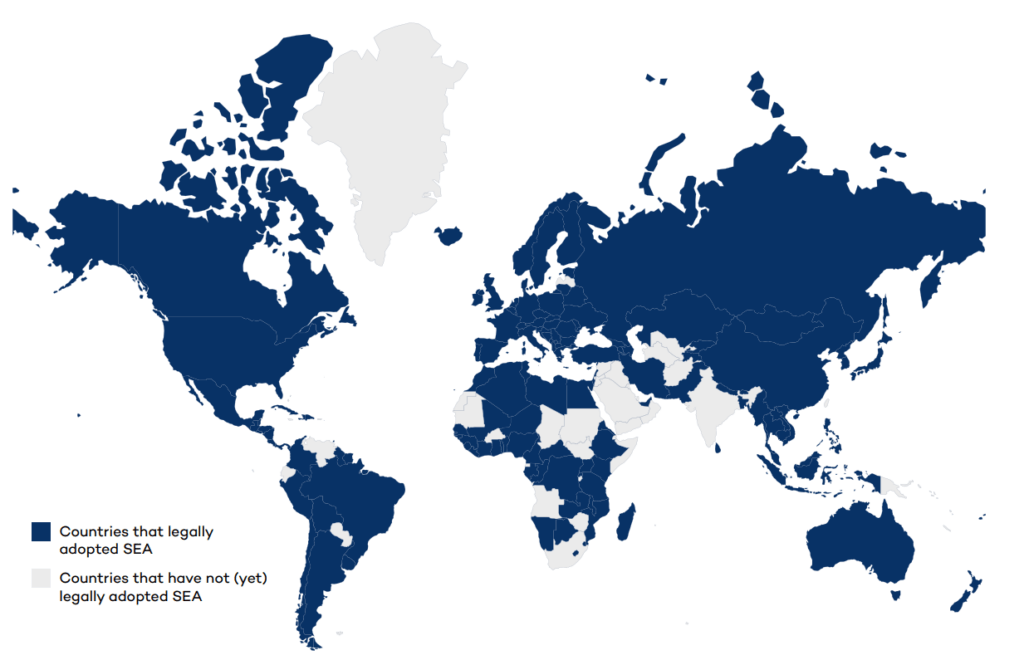Journey of the Strategic Environmental Assessment (SEA) implementation
The 43rd Annual Conference of the International Association for Impact Assessment (IAIA) discussed the impact assessment for a just transformation. Strategic Environmental Assessment (SEA) is a systematic method for evaluating the possible effects of proposed policies, plans, and programs (PPPs). It provides a complete view that considers social, cultural, economic, and institutional factors. By incorporating several aspects, SEA makes it easier to identify and mitigate negative consequences on both the environment and human well-being.
SEA was initiated in the United States in 1969 and has since gained considerable recognition and usage across the world. Its applicability goes beyond development countries, with an increasing number of developing countries realizing its importance in sustainable development initiatives. Today, SEA is a requirement in most industrialized nations’ regulatory systems, highlighting its critical role in supporting informed decision-making and encouraging environmentally responsible activities.
“SEA is helping the government to think about the long-term planning.” David Annandale, Co-Director of the International Environmental Policy Consulting Firm.
Cambodia has recently adopted the Environment and Natural Resource Code which introduced the implementation of the SEA in PPPs. Although Cambodia just initiated the SEA implementation, its legal frameworks and policies require an impact assessment including an Environmental Impact Assessment (EIA) for each development project. A 2018 study article examines the development and progress of Cambodia’s SEA. It emphasizes the proactive efforts made by the Cambodian SEA and defines future directions. There is also a commitment from the government and development partners to develop the SEA for Power Sector Planning in the Greater Mekong Subregion and Strengthening Sustainable Tourism: SEA of the Tourism Sector in Cambodia. Open Development Cambodia Organization (ODC) works to support the initiative of the SEA in Cambodia through various technical training, technical support, dialogues, outreaches, and awareness-raising workshops.
To ensure that the SEA is considered in the code, ODC, in collaboration with the National Council for Sustainable Development (NCSD), conducted training with the governmental officers including the Provincial Departments of Agriculture, Fishery and Forestry, Tourism, and Environment, and representatives from civil societies and partners. The technical workshop on environmental data and SEA was organized on 03 November 2022 in Phnom Penh. The event brought together 32 participants from the Ministry of Planning (MoP), international and local NGOs, community-based organizations (CBOs), journalists, researchers, and indigenous peoples (IPs). There was another follow-up workshop on embracing SEA in the environment and natural resource code on 22 November 2023, which brought together 51 participants from the Environmental Impact Assessment (EIA) Department of the Ministry of Environment (MoE), the NCSD of the MoE, the MoP, the Ministry of Tourism (MoT), EIA consultant firm, CSOs, Community-based Organization (CBOs), media, and indigenous peoples (IPs). ODC also contributed to providing inputs to the draft general guideline of SEA and the draft guideline of SEA for construction sand business projects along the Mekong and Bassac Rivers. Nonetheless, the future implementation of SEA may face barriers and obstacles, notably regarding budget limits and obligations. Such barriers have the potential to hamper or limit the successful implementation of SEA practices. Hence, it is critical to consider the recommendations and gain insights from countries with established SEA frameworks and practices. These findings can instruct and enrich the implementation process, resulting in a more robust and successful approach to SEA adoption.
There are some significant recommendations from the SEA-implementing countries that could be considered for SEA practices in Cambodia.
- Enhance the transparency in the SEA processes and thus increase the overall society trust in such processes
- Promote teamwork among SEA actors
- Increase communication between SEA actors
- Promote awareness and training for SEA actors
- Ensure close collaboration between government institutions during the SEA development
- Increase the participation rate in SEA consultation
- Consult with local representatives to identify potential barriers to participation, the best engagement strategies, and the most appropriate communication channels
- Consider using different methods to engage with different groups
- Consider organizing multiple opportunities for engagement
- Create personalized educational material to raise awareness about SEA
“Capacity building is the key because many governments are unaware of the SEA.” Joyce Kortlandt, Technical Secretary International Cooperation at the Netherlands Commission for Environmental Assessment (NCEA).
The recommendation also focuses on the development of SEA guidelines:
- Objective: emphasis on process requirements rather than content or outcome requirements
- Focus: shift from environment to sustainability
- Role: full and early integration in the planning process instead of “end of pipe” assessments
- Scope of application: add policies, clarify plans and programs
- Scope of assessment: stay away from EIA (Especially, Annexes)
- Implementation: encourage tailor-made national implementation.







